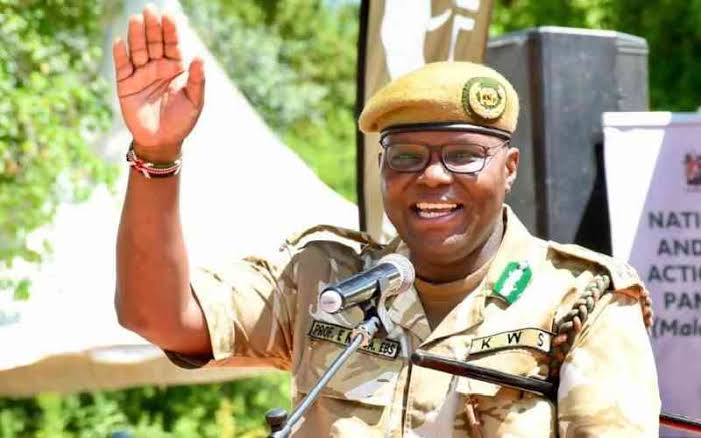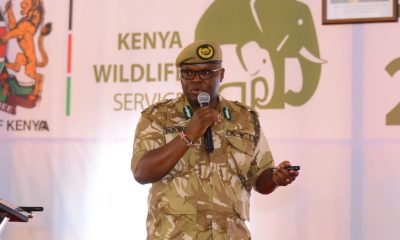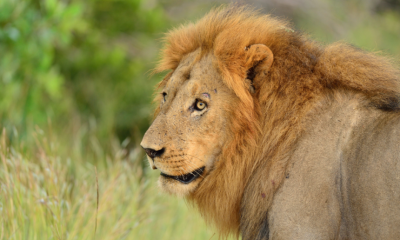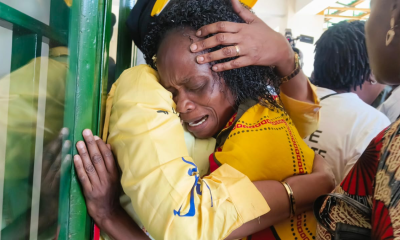Investigations
KWS DG Kanga On The Spot Over Alleged Coverup in Nakuru Fisherman’s Death Amid Multimillion Tender Fraud Claims
The twin scandals present a critical test for Kanga, whose reputation has been built on transparency and ethical governance during his tenure at the Ministry of Tourism, Wildlife & Heritage before taking the helm at KWS.

Kenya Wildlife Service Director General Dr. Erastus Kanga finds himself at the center of mounting controversies that threaten to tarnish his two-decade conservation legacy, as allegations of cover-ups and procurement irregularities cast a shadow over the wildlife agency’s leadership.
The seasoned conservationist is facing intense scrutiny over his handling of the mysterious disappearance of Brian Odhiambo, a fisherman from Nakuru, whose case has exposed what appears to be a systematic attempt to shield KWS officers from accountability.
Six rangers charged with abducting Odhiambo continue working at Lake Nakuru National Park despite facing criminal charges since May, raising questions about the agency’s commitment to justice.
During court proceedings, Assistant Director Emmanuel Koech’s testimony painted a troubling picture of how the service handles such incidents.
His admission that suspects can simply “escape” without proper documentation, and that rangers face no consequences if they provide “believable explanations,” suggests a culture of impunity that may extend to the highest levels of KWS leadership.
The case took a more sinister turn when phone records revealed that four of the accused rangers were at the same location as Odhiambo on the morning of January 18, the day he vanished.
Despite this evidence, and despite Senior Sergeant Francis Wachira and rangers Alexander Lorogoi, Isaac Ochieng, Michael Wabukala, Evans Kimaiyo, and Abdulrahaman Sudi being formally charged, none have been suspended from duty.
Compounding Kanga’s troubles is a damning ruling by the Public Procurement Administrative Review Board that exposed serious irregularities in a Sh740 million staff insurance tender.
The procurement watchdog discovered that KWS evaluators had fallen for a sophisticated forgery scheme that wrongfully eliminated Jubilee Health Insurance from the bidding process, clearing the path for Britam General Insurance to secure the lucrative three-year contract.
The forged authorization letter, allegedly from Jubilee and dated April 8, 2025, contained glaring errors including incorrect director names and a fictitious address.
When Jubilee officials examined the document, they immediately identified it as fraudulent, yet KWS had used it as grounds for disqualification without affording the company a fair hearing.
Staff insurance tender scam
Perhaps most troubling is the mysterious inflation of the contract value from Sh710 million to Sh740 million between Britam’s winning bid and the final award letter.
This unexplained Sh30 million increase, coupled with KWS proceeding to issue a letter of intent despite the tender being officially suspended following Jubilee’s complaint, suggests either gross incompetence or deliberate manipulation of the procurement process.
The twin scandals present a critical test for Kanga, whose reputation has been built on transparency and ethical governance during his tenure at the Ministry of Tourism, Wildlife & Heritage before taking the helm at KWS.
The agency, already grappling with funding constraints and human-wildlife conflict challenges, now faces questions about whether the same standards applied to wildlife protection govern its internal operations.
As PPARB has ordered a fresh evaluation of the insurance tender within 45 days, and as the Odhiambo case continues on September 1, Kanga must navigate these crises while maintaining public confidence in an institution critical to Kenya’s conservation efforts.
The coming weeks will determine whether these controversies represent isolated failures or systemic problems that require more fundamental changes in KWS leadership and culture.
For an organization that prides itself on protecting Kenya’s natural heritage, the allegations suggest that protecting institutional reputation may have taken precedence over protecting truth and accountability.
Kenya Insights allows guest blogging, if you want to be published on Kenya’s most authoritative and accurate blog, have an expose, news TIPS, story angles, human interest stories, drop us an email on [email protected] or via Telegram
-

 Grapevine1 week ago
Grapevine1 week agoAlleged Male Lover Claims His Life Is in Danger, Leaks Screenshots and Private Videos Linking SportPesa CEO Ronald Karauri
-

 Lifestyle1 week ago
Lifestyle1 week agoThe General’s Fall: From Barracks To Bankruptcy As Illness Ravages Karangi’s Memory And Empire
-

 Grapevine3 days ago
Grapevine3 days agoRussian Man’s Secret Sex Recordings Ignite Fury as Questions Mount Over Consent and Easy Pick-Ups in Nairobi
-

 Investigations2 weeks ago
Investigations2 weeks agoEpstein Files: Sultan bin Sulayem Bragged on His Closeness to President Uhuru Then His Firm DP World Controversially Won Port Construction in Kenya, Tanzania
-

 Business2 weeks ago
Business2 weeks agoKRA Can Now Tax Unexplained Bank Deposits
-

 Investigations1 week ago
Investigations1 week agoEpstein’s Girlfriend Ghislaine Maxwell Frequently Visited Kenya As Files Reveal Local Secret Links With The Underage Sex Trafficking Ring
-

 News1 week ago
News1 week agoState Agency Exposes Five Top Names Linked To Poor Building Approvals In Nairobi, Recommends Dismissal After City Hall Probe
-

 Business1 week ago
Business1 week agoM-Gas Pursues Carbon Credit Billions as Koko Networks Wreckage Exposes Market’s Dark Underbelly




























